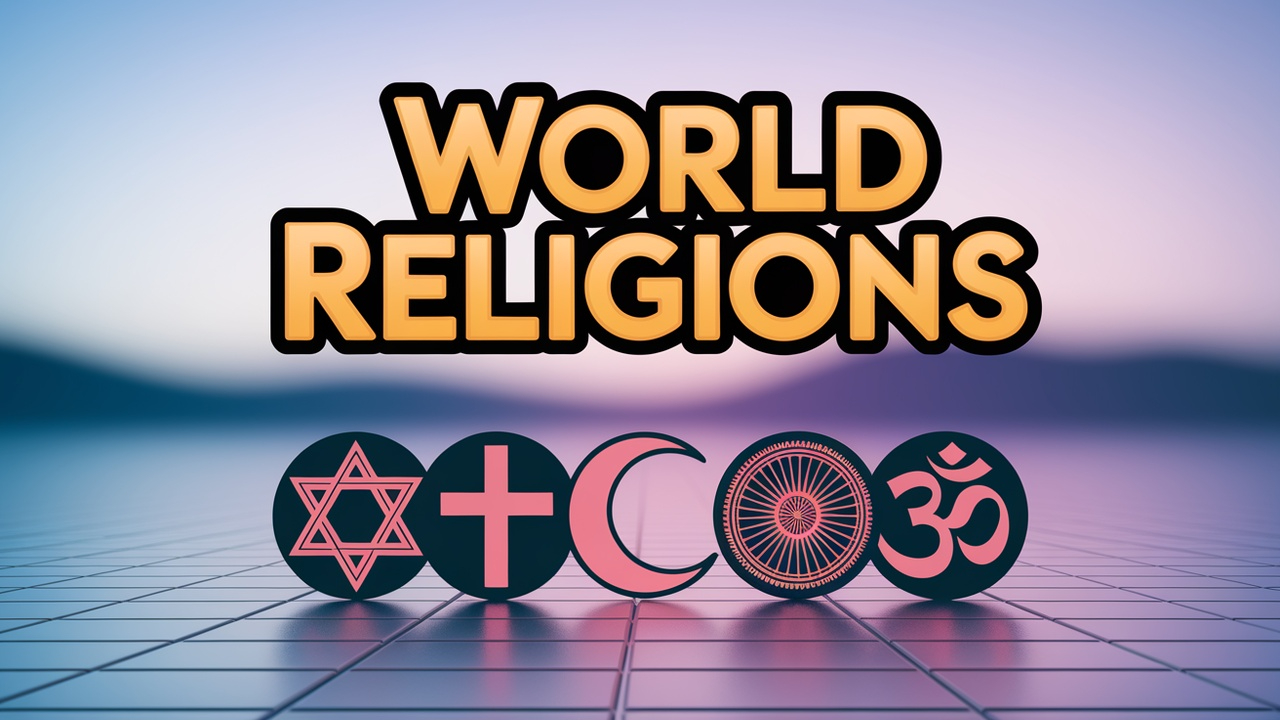
This course provides a comprehensive examination of major world religions, exploring their historical development, core beliefs, practices, and cultural impacts. Students will gain a fundamental understanding of the diversity of religious traditions and their significance in global society.
Course Levels
-
Level 1: Introduction to Religion
This level introduces the concept of religion, its definition, and its role in human society. Students will explore the basic elements that constitute religious belief systems.
-
Level 2: Abrahamic Religions
This level focuses on the three major Abrahamic religions: Judaism, Christianity, and Islam. Students will learn about their origins, key beliefs, sacred texts, and practices.
-
Level 3: Eastern Religions
This level examines major Eastern religions including Hinduism, Buddhism, and Sikhism. The focus will be on their philosophical foundations and practices.
-
Level 4: Indigenous and Folk Religions
This level explores indigenous and folk religions around the world, focusing on their unique traditions, beliefs, and cultural significance.
-
Level 5: New Religious Movements
This level investigates new religious movements (NRMs) and their emergence in contemporary society, exploring their beliefs, practices, and societal perceptions.
-
Level 6: Religion and Society
This level analyzes the relationship between religion and various aspects of society, including politics, economics, and culture.
-
Level 7: Critical Perspectives on Religion
This level presents critical perspectives on religion, including secular, feminist, and postcolonial critiques.
-
Level 8: Comparative Religion
This advanced level encourages students to engage in comparative analysis of various religions, fostering critical thinking about similarities and differences.
Course Topics
-
Religious Pluralism
# Understanding Religious Pluralism Religious pluralism is a concept that recognizes the coexistence of multiple religions, beliefs, and practices within a single society or across the world. It ackn...
-
Diversity within Eastern Religions
# Diversity within Eastern Religions Eastern religions encompass a wide range of beliefs and practices originating from Asia, including Hinduism, Buddhism, Jainism, Sikhism, Confucianism, Taoism, and...
-
Global Religion: Trends and Future Directions
# Global Religion: Trends and Future Directions ## Introduction In the contemporary landscape, global religions are undergoing significant transformations influenced by various factors including glob...
-
Shamanism and Animism
# Shamanism and Animism ## Introduction Shamanism and animism are foundational components of many indigenous and folk religions around the world. They reflect a deep connection to nature, spiritualit...
-
Islam: History and Beliefs
# Islam: History and Beliefs ## Introduction to Islam Islam is one of the major world religions, along with Christianity and Judaism. It is a monotheistic faith that believes in one God (Allah in Ara...
-
Religion and Politics
# Religion and Politics ## Introduction The interplay between religion and politics is a dynamic and multifaceted aspect of human society. Throughout history, religious beliefs have influenced polit...
-
Christianity: History and Beliefs
# Christianity: History and Beliefs ## Introduction to Christianity Christianity is one of the world's major religions, with over 2 billion adherents globally. It is based on the life, teachings, dea...
-
Religions of the Native Peoples of the Americas
# Religions of the Native Peoples of the Americas ## Introduction The religions of the Native Peoples of the Americas are rich, diverse, and deeply intertwined with their cultures and histories. Thes...
-
The Future of Religion in a Globalized World
# The Future of Religion in a Globalized World ## Introduction In the 21st century, globalization has reshaped many aspects of human life, including religion. As people migrate, communicate, and shar...
-
Comparative Analysis of Abrahamic Religions
# Comparative Analysis of Abrahamic Religions The term "Abrahamic religions" refers to three major world religions that share a common origin in the figure of Abraham. These religions are Judaism, Ch...
-
Religious Festivals in Eastern Traditions
# Religious Festivals in Eastern Traditions Religious festivals serve as a vital expression of faith and community in various Eastern traditions. They are occasions for celebration, reflection, and c...
-
African Traditional Religions
# African Traditional Religions African Traditional Religions encompass a diverse range of spiritual beliefs and practices across the African continent. These religions are deeply intertwined with th...
-
Secularism and Religious Freedom
# Secularism and Religious Freedom ## Introduction Secularism and religious freedom are crucial concepts in understanding the relationship between religion and society. Secularism refers to the separ...
-
Case Studies of Prominent NRMs
# Case Studies of Prominent New Religious Movements (NRMs) New Religious Movements (NRMs) have emerged as significant cultural and spiritual phenomena in the contemporary world. This section delves i...
-
Sikhism: Core Concepts and Practices
# Sikhism: Core Concepts and Practices Sikhism, founded in the Punjab region of South Asia in the 15th century by Guru Nanak Dev Ji, is a monotheistic religion characterized by its unique teachings a...
-
Characteristics of Indigenous Religions
# Characteristics of Indigenous Religions Indigenous religions encompass a wide range of spiritual beliefs and practices that are rooted in the traditions of specific cultural groups. These religions...
-
Comparative Methodologies in Religious Studies
# Comparative Methodologies in Religious Studies ## Introduction The field of Religious Studies often employs various comparative methodologies to analyze and interpret the vast array of beliefs, pra...
-
The Concept of the Divine Across Religions
# The Concept of the Divine Across Religions The concept of the divine is one of the most profound and complex aspects of human culture and spirituality. Different religions offer varied perspectives...
-
Postcolonial Perspectives on Religion
# Postcolonial Perspectives on Religion Postcolonial studies examine the impact of colonialism on cultures and societies, including the domain of religion. This topic explores how colonial histories ...
-
Defining New Religious Movements
# Defining New Religious Movements New Religious Movements (NRMs) are faith systems that have emerged relatively recently in comparison to established world religions such as Christianity, Islam, Bud...
- And 20 more topics...